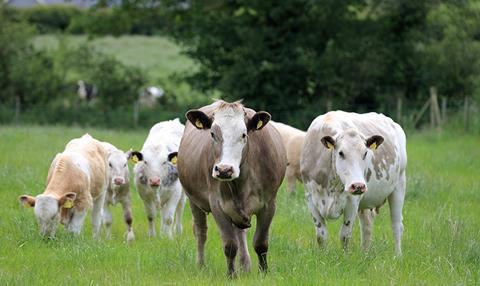In 1992 the Livestock and Meat Commission (LMC) in Northern Ireland officially launched the Northern Ireland Beef and Lamb Farm Quality Assurance Scheme (NIBL FQAS). Thirty years on the scheme has strong industry support.

Supermarket perspective
Looking at the NIBL FQAS from a retail perspective, Joe McDonald, Asda corporate affairs manager said: “From an Asda perspective I am delighted that NIFQA beef and lamb is strongly to the fore on our shelves and is an integral part of our offering in our Northern Ireland stores.
"Trust is at the heart of the relationship between retailers and their customers and there are many ways to build this, not least through the professional independent accreditation approach of NIFQA. This is certainly the case with beef and lamb, and hence the importance of the scheme, providing an every-day assurance to our customers that their product is local and produced to high standards on Northern Ireland farms. It is a credit to the industry that such a professional scheme has been developed and evolved over three decades.”
Since then, LMC has owned and managed the scheme on behalf of the NI beef and sheep sectors. At its inception the scheme was framed as a code of best practice, however, it has now become a fundamental imperative for every farmer finishing cattle and sheep in NI.
Scheme's 30 year evolution
LMC NIBL FQAS manager Gillian Davis said, “While participation in the NIBL FQAS is voluntary, the value which stakeholders at all stages of the supply chain place on the assurances NIBL FQAS delivers paints a very clear picture of its worth.
“The scheme launched in 1992 with over 1,000 participants and 100k cattle assured at that time. From a farm participation perspective, the last 30 years have brought incremental growth and seen this figure rise to its current standing of 11,600 scheme participants.
“The last three decades have also brought evolutionary change within the retail sphere. Consumers now desire world class produce with full production transparency and data shows that NIBL FQAS farmers are rising to fulfil this requirement. At the end of the 2021-22 financial year the percentage of price reported prime cattle that were farm assured at time of slaughter was 98.7%. Steers represented the highest category for assurance proportion at 99% with cull cows reaching 92.7% at the year end. Clear price benefits come from marketplace returns for NIBL FQAS status cattle and sheep. Moreover, many abattoirs require NIBL FQAS status as a prerequisite.
“From the outset the aim for the NIBL FQAS was to assure consumers that beef and lamb was wholesome and free from unnatural substances. Over the past three decades the scheme has held true to its core values and continually developed to meet industry, legislative and consumer needs. As we reflect on the past thirty years it is pleasing to see industry voice support for the NIBL FQAS right from the farm gate to the consumers plate.”
Exporters' view
Conall Donnelly, Northern Ireland Meat Exporters Association (NIMEA) remarked, “FQAS truly is an excellent supply chain initiative. It is unique in these islands, in that it is the only farm quality assurance scheme that is funded by both farmers and processors and it continues to be supported strongly by the entire industry. Its unique delivery model, with a single, not-for-profit, certification body (NIFCC), has helped to ensure a uniform approach to all farm inspections, and synergies through joint inspections across the beef and dairy sectors, reducing the burden on farms.
“As the market and regulatory environment has changed over the years, FQAS has responded and moved with the times. With the strong support of industry, FQAS has led the evidence-based development of its standards to address new and emerging challenges in a practical and proportionate way.”
From a consumer perspective, independent tracking data has confirmed high levels of consumer confidence in NIBL FQAS beef and lamb. Analysis of recent data shows the NIBL FQAS logo now resonates with the vast majority of NI consumers (82%). Consumers also report to actively seek out beef and lamb marked with the logo, demonstrating in a very telling way their perception of the high quality production credentials upheld at all stages of the supply chain.
Concluding Gillian said, “As we look forward, I have no doubt that the NIBL FQAS will remain one of the most successful supply chain initiatives in the beef and lamb sector. It will continue to evolve and support sustainable local red meat production in a totally quantifiable way.”
This story was originally published on a previous version of the Meat Management website and so there may be some missing images and formatting issues.















